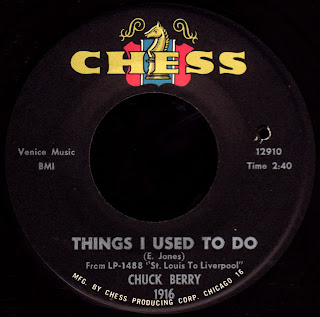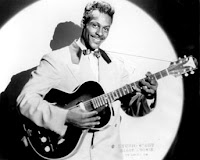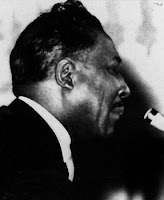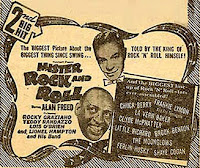 Things I Used To Do
Things I Used To DoWhen
Chuck Berry turned eighty last October, he played his regular gig at
Blueberry Hill in his hometown of St. Louis. As far as I can tell, the national press didn't cover the story.

Berry grew up in 'the Ville', a middle class black neighborhood in St. Louis. His mother, who sang with the Antioch Baptist Church choir, often held rehearsals right there in his living room. By the time he was six, Charles was joining in, and soon became a member, singing 'quartet style' with a few friends on the side as well. The music was all around him, and he loved listening to the radio late at night pulling in the blues from Kansas City and beyond.

He brought the house down at Sumner High School when he got up on stage and ripped into
Confessin' The Blues,
Hootie McShann's 1941 smash. Chuck loved the attention, and began practicing on an old four string guitar somebody gave him, making it up as he went along. By his senior year, he had managed to get himself a proper six string, and became quite popular, playing whenever and wherever he could.

In the summer of 1944, Berry and two friends took off on a road trip to Kansas City in his 1937 Oldsmobile. Before it was over they had been arrested for a supposed armed robbery and hauled off to jail. They were sentenced to ten years, and sent to the Intermediate Reformatory for Young Men, a juvenile prison in central Missouri. Making the best of a bad situation, Chuck soon formed a Gospel quartet with his inmates that became so popular they were asked to perform all over the state. As it turned out, the lead vocalist in the group (
Po' Sam) was also a guitar player, and Berry 'went to school' on him, making good use of his time out of circulation.

A 'model prisoner', Chuck was released after serving only three years, and was back on the streets of St. Louis by the time he was 21. He continued performing, and by now had developed his own style. In 1950, Berry was working as a janitor at radio station
WEW when a local guitarist named
Joe Sherman offered to sell him his electric guitar for thirty dollars. He jumped at the chance, and was able to take his act to the next level. Before long he was playing regular gigs at local clubs, and becoming well known on the circuit.

On New Year's Eve in 1952, Chuck got a phone call from
Johnnie Johnson, whose group
The Sir John Trio was scheduled to perform at the upscale Cosmopolitan Club, one of the top black nightspots in the state. Their sax player was sick, he said, and he wondered if Chuck could help him out and play with them that night. Berry's magnetic personality and unique guitar work was quite the sensation, and Johnson asked him to join his outfit. Before long they became the house band at The Cosmopolitan, and Chuck's sly mixture of country and blues earned him the nickname 'the black hillbilly'. Johnson, realizing that Berry was now the 'front man', agreed to change the name of the group to
The Chuck Berry Combo. Along with drummer
Ebby Hardy, Johnson and Berry made a name for themselves playing to packed houses in and around St. Louis. "Johnnie and I became so tight in feeling each other's direction, that whenever I played a riff... he would answer it with the same melodic pattern, and vice versa," Berry has said. Together they would change everything.

As a black electric guitar player in the early fifties, Chuck couldn't help but idolize
Muddy Waters. His music had come roaring back down the Mississippi from Chicago, giving voice to the shared experience of a generation. Songs like
Louisiana Blues and
Long Distance Call were positively huge down south, and were re-defining 'the blues'. By 1955, Muddy had placed nine consecutive songs in the R&B top ten, including the immensely popular
I'm Your Hoochie Coochie Man, which was written by the great
Willie Dixon especially for him. Waters had 'attitude', and plenty of it.

Small wonder, then, that on a trip to Chicago in the spring of 1955, Chuck sought out Muddy. After watching his set at a crowded Forty-Seventh Street club, Berry introduced himself and asked for advice on who he should go see if he wanted to 'make a record'. "See
Leonard Chess," Waters told him. Waiting in a doorway across the street until Chess showed up on Monday morning, Berry did just that. "Muddy Waters sent me," he said. Chess told him to bring some kind of demo tape or something, and sent him back to St. Louis.

A week later he was back in Chicago with a home-made tape of four songs he had written. Chess especially liked a 'hillbilly' number called "Ida May," but wanted Berry to change the title as it was too close to
Bob Wills' western swing hit
Ida Red. It was Chess who came up with the name
Maybellene, supposedly after spotting the name on a box of make-up that belonged to his secretary. They entered the studio on May 21st, with Willie Dixon playing bass behind Berry and Johnnie Johnson. Inexperienced in the studio, it took them thirty six takes to give Leonard Chess the sound he wanted... the sound that would make history. Muddy Waters'
Manish Boy was released as Chess 1602, Maybellene was Chess 1604 (1603 had been a Gospel release by
The Dixieland Singers). The baton had been passed.

Chess personally delivered an advance copy to
Alan Freed in New York, working out a deal that handed him one third of the composer's royalties (as he would later tell
Etta James, "There's some deals you just have to make"). Freed was all over it, reportedly playing the record for two hours straight at one point. It became a huge smash, selling more copies than Chess could have even imagined. By August, it had topped all three of Billboard's R&B charts (Jukebox, Airplay, and Record Sales), and was blaring out of car radios 'motorvatin' across America. As it cruised to #5 on the pop charts that September, Leonard Chess was a happy man.

Berry was annoyed when he found out he was sharing his royalties with Freed, and made sure Chess removed his name from future releases (going so far as to list "Chuck Berry, Inc." as the composer on all of his songs from then on). He was a realist, however, and continued to 'play nice' with Freed, headlining his fabled Rock & Roll extravaganzas, and appearing in films like
Rock, Rock, Rock and
Mister Rock & Roll with him. Songs like
School Day and
Sweet Little Sixteen continued to dominate the top ten, and by the end of the decade Chuck Berry was a force to be reckoned with.

He began investing in real estate, buying up large tracts of land in and around St. Louis. He opened a popular club in the downtown theater district called
Chuck Berry's Bandstand, which served both blacks and whites, and had started work on an amusement park just outside of town that sported a hotel with a guitar shaped pool. The white establishment had seen enough. He was charged with violating the Mann Act, allegedly transporting an underage Indian girl "across state lines for the purposes of prostitution" in 1959. In a
much publicized trial, he was found guilty by Federal Judge George H. Moore in March of 1960, and sentenced to five years in prison. Charging 'racial improprieties' in his trial, Berry appealed the case before Chief Justice Roy W. Harper in 1961. The high court upheld the decision and he was carted off to prison in February of 1962, with his sentence being dropped to three years and a $10,000 fine. Both
cases are still studied in Criminal Law classes today because they "demonstrate not only the racial prejudice which existed at the time of his trial, but also how courts and juries sometimes stretch or interpret the facts to fit a crime."
In plain English, he was railroaded right out of the top ten into the Federal pen. They got Alan Freed too... brought 'em down, man. You read things like 'Chuck Berry was never the same again' or 'he emerged from prison a bitter man'. Damn right.

His incredible songwriting skills remained intact, however, and he was back in the top ten with
No Particular Place To Go in the summer of 1964. Meanwhile,
The Beach Boys had ripped the melody for Surfin' USA right out from under him, and the 'British Invasion' had begun, with nice clean white boys playing his music on the radio. Nevertheless, he continued to chart with great songs like
You Never Can Tell and
Little Marie before releasing our current selection.

The flip of the amazing
Promised Land (a song which would go on to be performed some 400 times by the
Grateful Dead over the years), today's B side is a cover of
Guitar Slim's 1954 blockbuster hit. As far as I'm concerned, Chuck Berry is just as much a blues man as anything else, and I love his smoky driving attack on this great song we have here... check out Johnnie Johnson's piano! What a band this was, folks. You know you always hear that silly thing; 'the Blues had a baby, and they called it Rock & Roll'... well, as
John Lennon once said, "...you might call it Chuck Berry."
Promised Land would be Chuck's last chart entry until he hit #1 eight years later with the annoying
My Ding-A-Ling...

In 1986,
Keith Richards organized a sixtieth birthday party for Berry at the Fox Theater in St. Louis. The resulting movie,
Hail, Hail Rock & Roll was released the following year. While one good thing to come out of the film was the re-emergence of Johnnie Johnson, I think it did more to tarnish Chuck Berry's image than anything else. I remember going to see it with a friend of mine in London when it first came out, and leaving the theatre with the distinct impression that Berry was not a nice guy. A bourbon swilling Richards goes out of his way to tell the viewer how Berry was more difficult to work with than even
Mick Jagger, and is forever crying about what key Chuck plays what song in. The movie has been released on DVD, with 'bonus footage' that further delineates what a hard time
Taylor Hackford and the rest of the crew had making the film with such a
Reluctant Movie Star. Poor babies.

Chuck Berry is, in my opinion, another Black entertainer upon whom the mainstream American media has turned its back for not playing the game the way they want him to.
James Brown was one, as is
Ike Turner... I could go on. Consider the fact that he performed before sold-out houses in Moscow, Paris, Stockholm and Copenhagen on his recently completed 80th Birthday tour, while here in his home town he's playing in a bar.
He deserves better.

 Just like last year, I found myself at the incredible Carnaval Ponceños down in Puerto Rico. The central Plaza in Ponce echoes with the African rhythms of the buléador and subidor as performers in colonial dress dance the traditional Bomba to kick things off. The infectious beat seems to increase in volume and intensity until it seems that everybody in the city is moving as one.
Just like last year, I found myself at the incredible Carnaval Ponceños down in Puerto Rico. The central Plaza in Ponce echoes with the African rhythms of the buléador and subidor as performers in colonial dress dance the traditional Bomba to kick things off. The infectious beat seems to increase in volume and intensity until it seems that everybody in the city is moving as one. As the initial floats of the parade begin to reach the Plaza, the crowd presses to get a glimpse of the elaborate costumes of this year's crop of Vejigantes. Literally thousands of adolescent boys take to the streets. Most of them are wearing hand-made masks and colorful robes and carrying inflated cow bladders (I kid you not). The bladders are part of a tradition in which one's sins are atoned for by getting whacked by one of these prowling Vejigantes prior to the onset of Lent on Ash Wednesday. Wild stuff.
As the initial floats of the parade begin to reach the Plaza, the crowd presses to get a glimpse of the elaborate costumes of this year's crop of Vejigantes. Literally thousands of adolescent boys take to the streets. Most of them are wearing hand-made masks and colorful robes and carrying inflated cow bladders (I kid you not). The bladders are part of a tradition in which one's sins are atoned for by getting whacked by one of these prowling Vejigantes prior to the onset of Lent on Ash Wednesday. Wild stuff. As night descends on the city, the parade (now some six hours old) winds through the streets and seems to set the town on fire. High School 'drum lines' pound out a relentless tattoo as the best and brightest from the surrounding countryside show off their colors and their steps. The whole thing is just an amazing mixture of Latin, African and American culture (the 2007 Carnaval was actually dedicated to those Boricua living in New York!) that has to be seen to be believed.
As night descends on the city, the parade (now some six hours old) winds through the streets and seems to set the town on fire. High School 'drum lines' pound out a relentless tattoo as the best and brightest from the surrounding countryside show off their colors and their steps. The whole thing is just an amazing mixture of Latin, African and American culture (the 2007 Carnaval was actually dedicated to those Boricua living in New York!) that has to be seen to be believed.  My visit to Ponce wouldn't be complete, of course, until I stopped by Tita's Record Shop and hunted down some vinyl for us. Just like last year, she came through, and I walked away with over forty 45s for under $20. God bless this woman! Today's 'Lado B' selection (which translates as 'Three Kisses') is another fine example of the distinctly Puerto Rican music of 'Los Trios'. The interplay between the guitar and the cuatro, along with that sweet three part harmony, just takes me away to another time and place. I love it. I have no clue as to who the Trio Palmar might be... there's no reference to them (or Tope Records) anywhere on the web. We'll see what happens.
My visit to Ponce wouldn't be complete, of course, until I stopped by Tita's Record Shop and hunted down some vinyl for us. Just like last year, she came through, and I walked away with over forty 45s for under $20. God bless this woman! Today's 'Lado B' selection (which translates as 'Three Kisses') is another fine example of the distinctly Puerto Rican music of 'Los Trios'. The interplay between the guitar and the cuatro, along with that sweet three part harmony, just takes me away to another time and place. I love it. I have no clue as to who the Trio Palmar might be... there's no reference to them (or Tope Records) anywhere on the web. We'll see what happens. Anyway, I really can't say enough about this wonderful place. The mountains, the miles and miles of unspoiled beaches, the music, the food, the coffee, the Rum... all that and 85° weather in February. It's no wonder they call it La Isla Del Encanto.
Anyway, I really can't say enough about this wonderful place. The mountains, the miles and miles of unspoiled beaches, the music, the food, the coffee, the Rum... all that and 85° weather in February. It's no wonder they call it La Isla Del Encanto. 








































